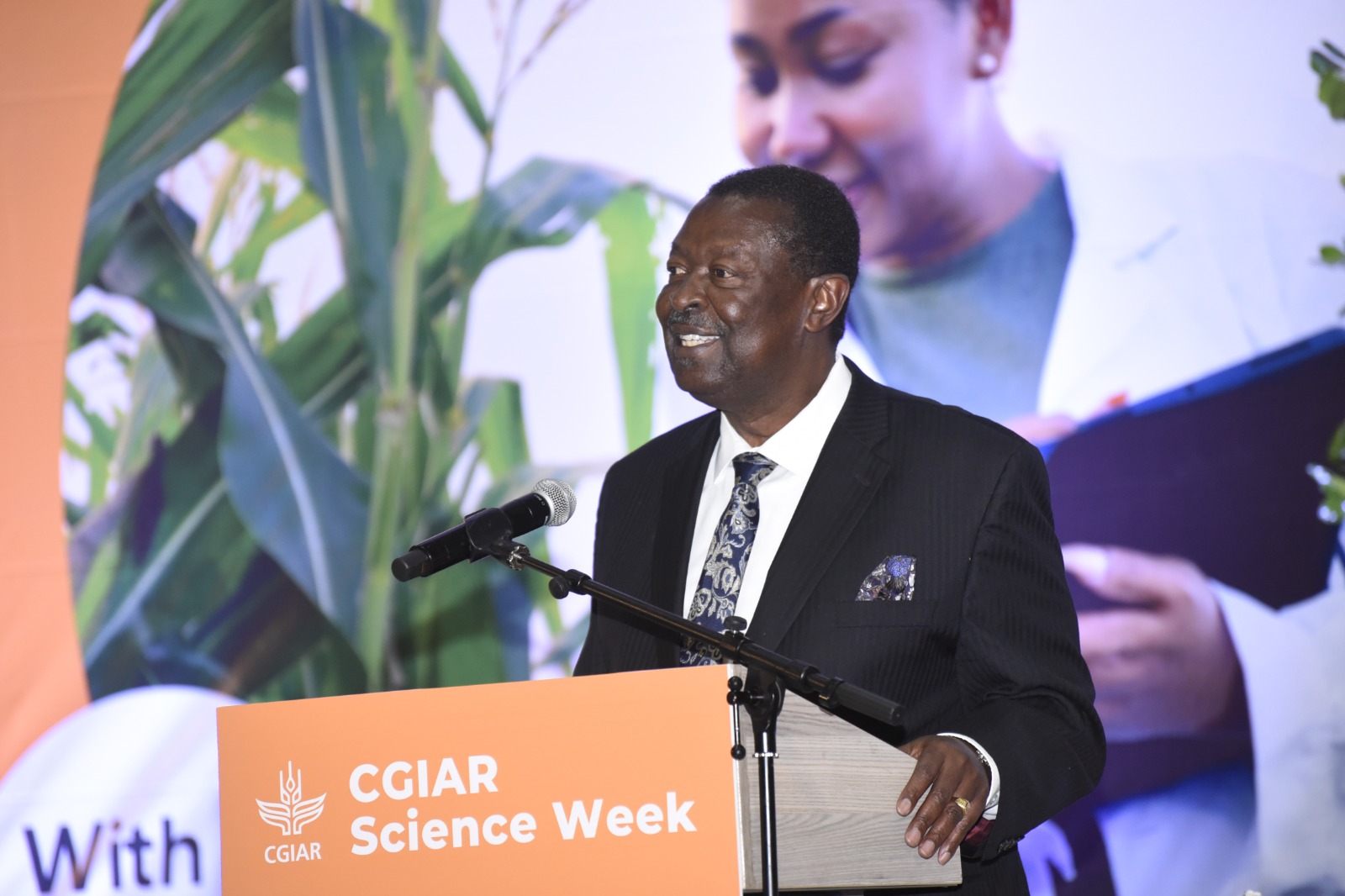

Prime Cabinet Secretary Musalia Mudavadi has called for science-driven solutions and multi-stakeholder partnerships to address the pressing food security challenges the world faces today.
Speaking at the official opening of the Consultative Group on International Agricultural Research (CGIAR) Science Week 2025 at the United Nations Campus in Nairobi, Mudavadi pointed out that agriculture, which provides employment to over 60 per cent of Africa’s population, is under significant threat from climate change, extreme weather conditions, and a host of other factors.
These include land degradation, soil infertility, food insecurity, malnutrition, postharvest losses, and limited access to technology, financing, and investment.
Mudavadi, noting that this year’s theme, “With Science We Can”, is particularly timely, urged for a collective approach to overcome the environmental and food security challenges confronting the world.
He said the only path forward is through science-driven solutions and strategic partnerships.
“The challenges we face in agriculture, from climate change to postharvest losses, are immense. But this Science Week presents a defining moment to engage on how to mitigate these challenges,” Mudavadi said.
“It is a call to action for governments, researchers, the private sector, and development partners to chart a new path for sustainable agriculture and resilient food systems in low- and middle-income countries.”
The CS encouraged participants to be bold in their ideas, strategic in their partnerships, and ambitious in their actions, aiming to make decisions that will contribute to Africa’s food security.
“Your insightful discussions, fruitful collaborations, and transformative solutions will help shape the future of food security in Kenya, Africa, and the world,” he added.
Dr. Ismahane Elouafi, the CGIAR Executive Managing Director, noted the gravity of the global food crisis.
"We are currently witnessing one
of the most severe food shortages in human history. We still have 800 million
people who are hungry, and 350 million are starving. Children are the most
affected,” Elouafi said.
Elouafi pointed to the compounded challenges of the COVID-19 pandemic, emerging conflicts, and accelerating climate change.
“This is detrimental to all of us, but the impact is particularly devastating for women who cannot feed their children. The most vulnerable communities suffer the most,” she added.
“This is where science comes in; science is the hope, and science is part of the solution.”
She also pointed out the importance of innovation, not just technological, but also in policy, finance, institutions, and society.
“This broad spectrum of innovation is the solution that CGIAR continues to focus on,” Elouafi said.
She called for increased funding to support CGIAR’s mandate and encouraged farmers to engage more with scientists.
“I also urge the youth to consider agriculture as a career. We all need food, and you could be the solution in the future,” she said.
Zainab Hawa Bangura, the United Nations Office of Nairobi (UNON) representative, noted the unique opportunity the event presents for participants to reflect on their shared commitment to science-driven solutions.
“As you engage in this week of collaboration, knowledge exchange, and dialogue, remember the critical role CGIAR plays in advancing food security, improving livelihoods, and fostering sustainable agricultural practices globally,” Bangura said.
She stated the importance of building partnerships to combat climate change, ensure food resilience, and empower farmers and communities.
“This week will provide opportunities to learn from one another, share successes, brainstorm, and tackle the challenges that lie ahead,” she said.
“Through innovation, research, and groundbreaking technologies, agriculture will play a critical role in serving both people and the planet.”
Bangura concluded by urging participants to make lasting collaborations and decisions that will carry forward critical discussions into the next era of agricultural science and sustainability.
The CGIAR Science Week, organized in collaboration with the
Kenya Agricultural and Livestock Research Organization (KARLO) and the
International Livestock Research Institute (ILRI), is focused on innovation and
partnerships for a food, nutrition, and climate-secure future. It brings
together global leaders in agricultural research, innovation, and policy to
tackle the pressing challenges of food security and climate change.












